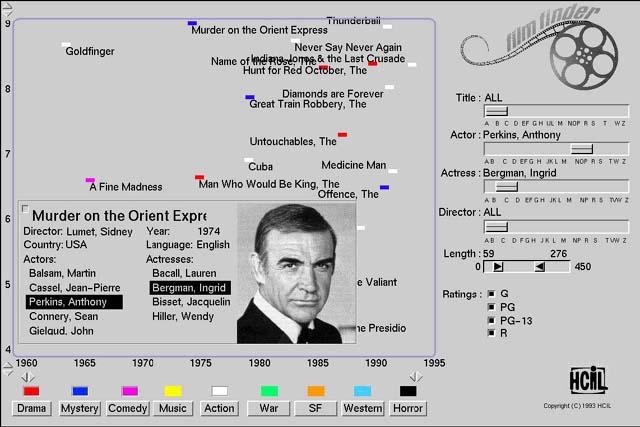Film Finder: Difference between revisions
m Reverted edit of Of3C40, changed back to last version by Iwolf |
Removed SPAM |
| (11 intermediate revisions by 4 users not shown) | |
(No difference)
| |
Latest revision as of 08:57, 27 August 2007
Developer
Article
The Article "Tight Coupling: Guiding User Actionsin a Direct Manipulation Retrieval System" involves besides Tight Coupling also The Film Finder, which we took as Visualization Technique in our Laboratory.
Authors
Short description
The Film Finder is a Software that supports users to search for certain films with different types of visualisation. It includes 1838 film titles, 5468 actors and 1463 directors.
This typical dynamic queries system presents films in a starfield (interactive scatterplot) with the year of production and the popularity of the films as axes. Users perform queries by manipulating query devices such as
rangesliders, alphasliders, and toggles.
[Ahlberg and Truvé, 1995]
Suitable Datatypes
Multi-Dimensional
- title
- actor/actress
- director
- length
- year
- popularity
- ...
Example and use cases
Films are presented in a starfield with the year of production and the
popularity of the films as axes. Users perform queries, for example by searching for films with Anthony Perkins and Ingrid Bergman between 59 and 276 minutes length.
An own screen will give invformation about certain film in the finding. The genre of the film is visualized with different colours.

Film Finder starfield example
[Ahlberg and Truvé, 1995]
Design issues
- Alphasliders: The index below the slider indicates the distribution of the strings over the slider. This particular alphaslider allows selection from two thousand filmtitles.
- Rangesliders: Rangesliders are used for selecting ranges of attributes, primarily integer attributes although other datatypes certainly are possible.
- Toggles: These are conceptually close to the alphasliders, although they allow the selection of multiple values. Tight coupling of the query mechanism should in this case make the toggles reflect which values are selectable – i.e. exists in some object remaining after the last query. This is effectively done by graying out the appropriate values.
References
- [Ahlberg and Truvé, 1995] Christopher Ahlberg & Staffan Truvé, Tight Coupling: Guiding User Actionsin a Direct Manipulation Retrieval System,
Chalmers University of Technology, 1995 Artikel - [Ludwig, 2004] Kerstin A. Ludwig, Star - Visualisierung von Daten, University Konstanz, 2004, PDF-Dokument
- [University of Maryland] Visual Information seeking using the FilmFinder, Interaction Design Laboratory, 2004, Open-Video.org


